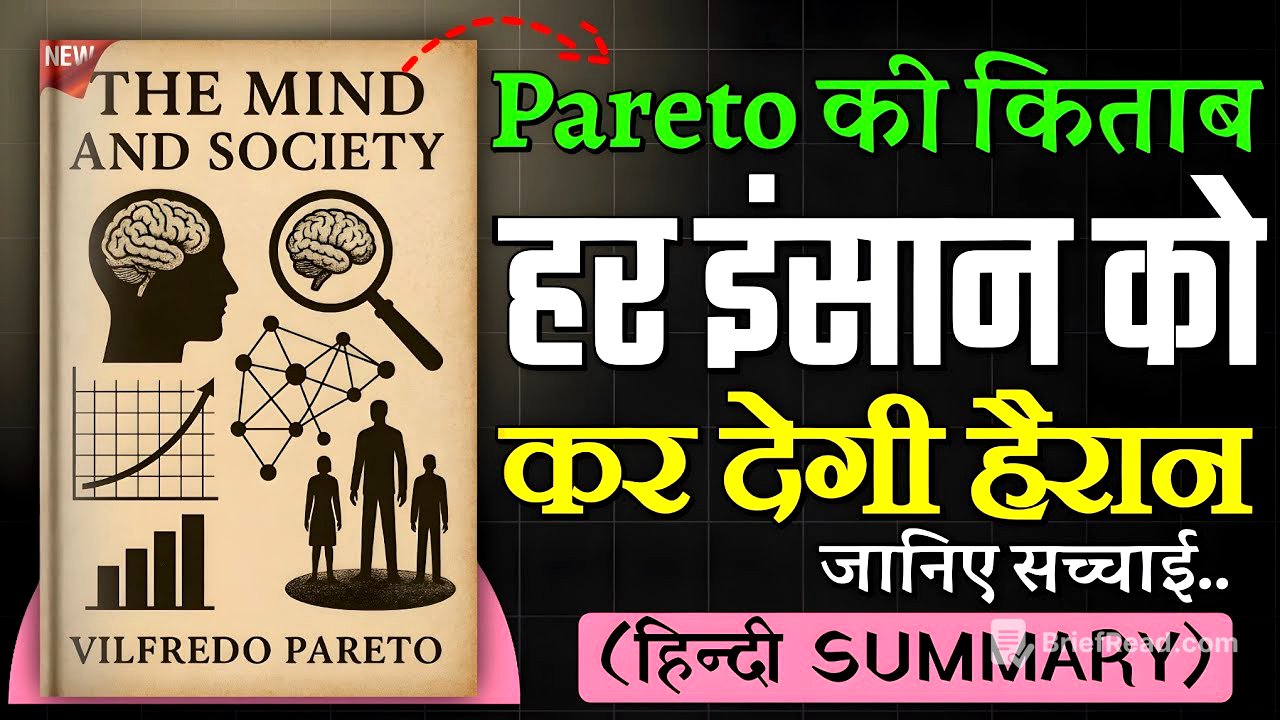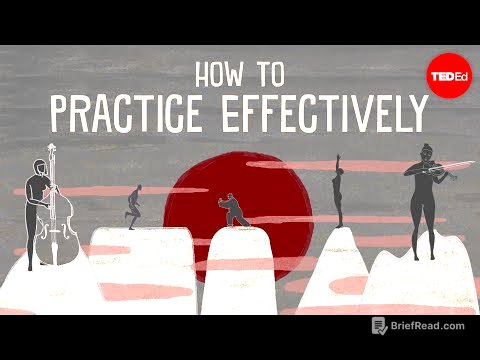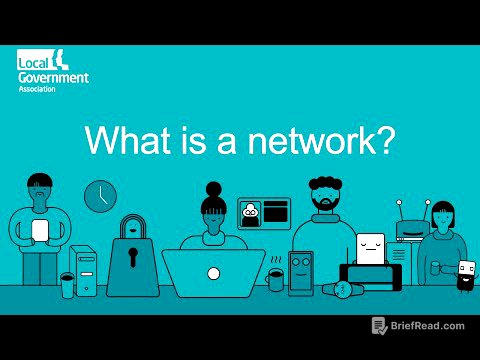TLDR;
This audiobook explores Vilfredo Pareto's sociological theories from "The Mind and Society," providing a framework for understanding human behavior and societal dynamics. It challenges the notion of humans as purely rational beings, introducing concepts like residues (deep-seated emotions), derivations (logical justifications for illogical actions), circulation of elites (the rise and fall of power), and social equilibrium (the balance within society). The audiobook aims to equip listeners with tools for self-awareness, critical thinking, and a deeper understanding of the forces shaping the world.
- Pareto challenges the idea of humans as rational actors, introducing the concept of "residues" as the underlying drivers of behavior.
- "Derivations" are the logical-sounding justifications people create to explain their non-logical actions.
- The theory of "circulation of elites" explains how power shifts between different groups in society over time.
- Pareto views society as a system striving for equilibrium, where changes in one part affect the whole.
Introduction [0:00]
The audiobook introduces Vilfredo Pareto, an Italian thinker whose work "The Mind and Society" offers a deep analysis of society and the human mind. Pareto's theories challenge the conventional belief that humans are primarily rational beings, arguing instead that deep-seated emotions and instincts drive most actions. The audiobook aims to teach listeners how to recognize these hidden forces, understand how the world truly works, and use this knowledge to improve their lives. It advises listeners to share or save the video for convenient, chunked listening due to its length and depth, emphasizing that the knowledge should be absorbed slowly and thoughtfully.
Chapter 1: The Man Who Saw Behind the Curtain - Why People Don't Do What They Say [2:01]
This chapter introduces Vilfredo Pareto as a "doctor of the community" who sought to understand the root causes of societal phenomena rather than just treating the symptoms. Pareto rejected the prevailing belief that humans are rational actors, arguing that this is a facade and that the real drivers lie "behind the curtain." He dedicated his life to understanding the forces behind revolutions, government changes, and wealth disparities. Pareto advocated for a "Logic Experimental Method," urging the examination of history, human behavior, and social phenomena as evidence. He observed recurring patterns in human actions across different eras and societies, noting a disconnect between people's words and their actual motivations. Pareto's work provides a lens to see beyond superficial explanations and understand the true reasons behind people's actions, though this perspective can be unsettling as it challenges the notion of humans as intelligent and civilized beings.
Chapter 2: The World of Logical and Non-Logical Actions [9:11]
The chapter explains Pareto's fundamental concept of dividing human actions into two categories: logical and non-logical. Logical actions have a clear objective and use means that are demonstrably effective in achieving that objective, both to the actor and an outside observer. Non-logical actions, which Pareto argues constitute the majority of human behavior, lack this clear connection between motive and means, or the connection is only valid in the mind of the actor. Examples of logical actions include engineering, trading, and medical prescriptions based on symptoms. Non-logical actions are driven by emotions, instincts, or social factors, such as praying for rain, voting based on family tradition, or buying a brand to fit in socially. Pareto emphasizes that understanding this distinction is crucial because assuming people are logical leads to misunderstandings. He argues that to influence or understand individuals or societies, one must grasp the non-logical emotions driving their behavior.
Chapter 3: Residues - The Powers of Your Subconscious Mind [17:00]
This chapter introduces the concept of "residues," which are the fundamental, stable, and universal emotions or instincts that underlie human actions. Pareto argues that these residues are the "deep programs" in our minds, shaped by evolution, that drive our behavior. He divides residues into six main classes, each controlling some aspect of our lives. The chapter discusses several key categories: "Instinct for Combinations" (the drive to create and innovate), "Persistence of Aggregates" (the tendency to maintain traditions and group affiliations), the need for expressing sentiments through external acts, and residues related to sociality. Understanding which residues are driving a person's actions allows us to see patterns in human behavior and understand motivations. The chapter concludes by posing the question of the role of logic, intellect, and philosophy if residues are the primary drivers of action, setting the stage for the introduction of "derivations."
Chapter 4: Derivations - The Beautiful Lies We Tell Ourselves and the World [25:14]
The chapter introduces "derivations," which are the arguments, explanations, ideologies, and stories that humans use to make their non-logical actions appear logical and respectable. While residues are constant and universal, derivations are constantly changing based on time, culture, and circumstances. The chapter provides examples of how different derivations have been used to justify the same underlying desire (e.g., greed) throughout history. Pareto divides derivations into several categories, including assertion (stating a point emphatically without proof), appeal to authority, appeal to sentiments, and verbal proofs. The chapter emphasizes the importance of identifying derivations to avoid being trapped in their net and to understand the underlying residues driving people's behavior. Recognizing derivations allows for intellectual freedom and the ability to see beyond propaganda and manipulation.
Chapter 5: Residues and Derivations in Real Life [33:46]
This chapter applies Pareto's concepts of residues and derivations to real-world examples in politics, religion, and the market. In politics, the chapter argues that people vote based on deep-seated residues like nationalism and loyalty to their group, rather than on logical policy considerations. Successful politicians are those who know how to awaken these powerful residues. In religion, beliefs, rituals, and traditions provide stability, identity, and a sense of belonging, while theology, mythology, and philosophy serve as derivations to explain and justify these beliefs. In the market, advertising is based on the psychology of residues, selling feelings and identities rather than just products. The chapter concludes by emphasizing that anyone seeking to influence a large group of people must speak the language of residues, addressing their deepest feelings, fears, and hopes.
Chapter 6: Circulation of Elites - The Rise and Fall of Power [42:10]
The chapter introduces Pareto's theory of the "circulation of elites," which posits that power continuously shifts from one group to another in society. Pareto argues that every society is divided into a ruling elite and a ruled class, and that no elite class remains in power forever. He identifies psychological and social reasons for this, including the fact that elites often lose the qualities that helped them gain power in the first place, becoming decadent and weak. Meanwhile, within the ruled class, individuals with the ambition and qualities necessary for leadership emerge. A healthy society incorporates these talented individuals into the elite, maintaining stability. However, when the elite becomes closed off and prevents new blood from entering, discontent grows, leading to revolution and the replacement of the old elite with a new one.
Chapter 7: Magicians and Warriors - Two Types of Leaders [1:00:04]
This chapter further nuances Pareto's analysis of elites by introducing two distinct types of leaders: magicians and warriors. Magicians rule through cunning, planning, and persuasion, while warriors rule through strength, determination, and force. Magicians are skilled at forging alliances, using deception, and adapting to changing circumstances, while warriors are loyal, courageous, and believe in tradition, order, and discipline. Pareto argues that a healthy society needs a balance of both types of leaders. Problems arise when power is completely dominated by either magicians or warriors. A society dominated by magicians may become economically prosperous but morally weak, while a society dominated by warriors may become rigid and oppressive.
Chapter 8: Society as a System - The Great Balance [1:05:20]
This chapter presents Pareto's view of society as a complex system in dynamic equilibrium, where all parts are interconnected and dependent on each other. He introduces the concept of "social equilibrium," explaining how changes in one part of society affect the entire system. Pareto argues that society is never static but constantly changing to maintain balance. He emphasizes that social reformers must understand this interconnectedness and consider the impact of their changes on the entire system. The balance of any society ultimately depends on the distribution of residues among its people, with too much "magic" leading to instability and too many "warriors" leading to rigidity.
Chapter 9: Can We Predict the Future? [1:11:59]
This chapter explores the extent to which Pareto's theories can be used to predict the future. While Pareto's principles can provide insights into potential social trends and political instability, he acknowledges that sociology is not an exact science like physics or chemistry. The complexity of social systems, the influence of unforeseen events, and the role of human consciousness and willpower make precise predictions impossible. Pareto's theories are best used as diagnostic tools for understanding the present, identifying social forces, and assessing the health of society, rather than as crystal balls for foretelling the future.
Chapter 10: How to Apply Pareto's Wisdom to Your Life [1:12:35]
This chapter provides practical ways to apply Pareto's wisdom to everyday life. The key lessons include: self-awareness (recognizing the role of residues in your own decisions), understanding others better (seeking to understand the residues driving their behavior), becoming aware citizens and consumers (being immune to deception and manipulation), adopting a balanced approach to change and stability, and cultivating intellectual humility. By applying these lessons, individuals can improve their relationships, make better decisions, and navigate the world more successfully.
Chapter 11: Conclusion - Seeing the World Through Pareto's Eyes [1:19:25]
The conclusion summarizes the key concepts explored in the audiobook, including the irrationality of human behavior, the role of residues and derivations, the circulation of elites, and social equilibrium. It emphasizes that understanding these concepts provides a new way of seeing the world, allowing individuals to recognize hidden meanings, question their own motivations, and protect themselves from manipulation. The audiobook encourages listeners to continue thinking critically and learning, and to appreciate the value of intellectual independence.









